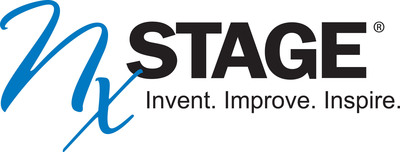
New Report Highlighting Lack of Patient Choice for Thousands of UK Kidney Patients Calls for Change
PR Newswire
LONDON, Oct. 9, 2018
Authors make urgent recommendations toward providing patients with access to the life-changing benefits possible with home haemodialysis
LONDON, Oct. 9, 2018 /PRNewswire/ -- NxStage Medical, Inc. (Nasdaq: NXTM), a leading medical technology company focused on advancing renal care, today published a report, 'Home haemodialysis: Tackling unequal access in the UK'. The report, developed by NxStage in collaboration with renal health professionals, kidney patients, and patient charities including Kidney Care UK and the National Kidney Foundation, highlights significant disparities over patient access to the life-changing benefits possible with home haemodialysis, and makes urgent recommendations towards improving access across the country. It also discusses opportunities for home haemodialysis to reduce costs associated with dialysis treatment for the NHS.

The National Institute for Health and Clinical Excellence (NICE) recommends that all patients who are suitable for home haemodialysis should be offered the choice of home therapy, but this is far from the case.1 Just 4.4% of the 28,000 patients on dialysis in the UK are on home haemodialysis - approximately 10% lower than NICE's recommendation.2 As a global comparison, compared to the UK's 4.4%, New Zealand has more than 17% of its dialysis patients dialysing at home and Australia has 9%.3
The report identifies lack of patient awareness and education of home haemodialysis as primary reasons for low penetration of the therapy. Independent polling of kidney haemodialysis patients found that 27% were not educated on all types of dialysis that would be beneficial to them, and 31% of in-centre patients cite never being offered home haemodialysis as a treatment option.4
The report shows that, city to city, it is a postcode lottery as to who has access to the potential benefits of home haemodialysis. Derby has the highest uptake in the UK, with 13.2% of dialysis patients on home haemodialysis, three times higher than the national average. Portsmouth and Manchester are the only other cities hitting recommended targets, with an uptake over 10%.5 Where patients live in the UK has a significant impact on their ability to access home haemodialysis as a therapy option.
This lack of access to home haemodialysis denies many patients the opportunity for improved health and a better quality of life - the home is the most practical setting for patients to perform haemodialysis at the frequency and duration that best suits their clinical needs. More frequent haemodialysis has been shown to lead to better clinical outcomes, including improved survival6, reduced risk of cardiovascular morbidity, 7, reduced need for blood pressure medications8, improved physical and mental quality of life9, and more energy.10 Improved health can also increase a patient's likelihood of receiving a kidney transplant.11
More frequent haemodialysis can also dramatically reduce recovery time. The average in-centre patient reports eight hours of post-dialysis recovery time, compared to just one hour for those dialysing more frequently at home.12 Compared to home haemodialysis patients, in-centre haemodialysis patients lose 52 days per year to recovery time, travelling to appointments, and waiting at the hospital.13
Increasing the uptake of home haemodialysis has potential benefits for the NHS, especially considering the need for haemodialysis may double across the world by 2030.14 A large cost of in-centre haemodialysis is transport, with patients travelling to and from the hospital for therapy. According to the National Kidney Federation, in the 52 hospitals across England that offer dialysis, 50% of their patient transport costs are accounted for by dialysis.15
The report urges healthcare professionals and the government to take action towards increasing patient access to home haemodialysis. Recommendations include strengthened patient education programs, dedicated staff responsible for supporting home programmes, and better patient-to-patient interactions.
Other key data from independent polling of kidney haemodialysis patients mentioned in the report include:
- 77% of home haemodialysis patients report an improvement in their health since dialysing at home and 26% relied less on medication.
- 62% of in-centre haemodialysis patients want more flexibility on how often they dialyse, with 63% spending less time with friends and family and 52% not being able to go on holiday.
- Since beginning home haemodialysis, 58% of patients report being happier, 52% witness decreased anxiety levels, and 71% have more leisure time.
- Taking into account additional costs that otherwise wouldn't be spent, such as travel, parking, food, and childminding, the average in-centre patient also spends £1,019 of their own money each year on their own life-saving treatment.16
Dr. Natalie Borman, Care Group Director for Renal and Transplantation, Wessex Kidney Centre, Portsmouth, which has one of the largest home haemodialysis departments in the UK, says:
"Queen Alexandra's home haemodialysis programme was established in response to increasing evidence that more frequent haemodialysis is associated with improved survival, better patient outcomes and improved quality of life. It's important for patients to have the right to choose which treatment is best for them and their life. Of course, it is not right for everyone, but patients should not be excluded based on their medical conditions alone."
Matt Walker of NxStage Medical UK, Ltd., provider of home haemodialysis machines says:
"Dialysis is a life-saving treatment for patients with kidney failure and access to it should not be impacted by differences across NHS trusts, a person's financial circumstance, or geographical location. With the number of people needing dialysis continuing to rise, now is the time for government and healthcare professionals to focus on improving the uptake of home haemodialysis. Whether dialysing in hospital or at home, all patients should have access to the treatment that is right for them."
Matt Herbert, current home haemodialysis patient, says:
"Because I dialyse more frequently, my overall health has improved. I found it to be really difficult to rely on hospital visits, especially for my mental health. It was really tricky to juggle all aspects of my life – my dialysis appointments, my job, and my family. Moving to home haemodialysis has really helped me to have the freedom to choose when and where I dialyse. I can now travel abroad for holidays, be more focused at work, exercise, and spend quality time with my new-born child and family."
About NxStage Medical
NxStage Medical, Inc. (Nasdaq: NXTM) is a leading medical technology company, headquartered in the United States, that develops, manufactures and markets innovative products for the treatment of end-stage renal disease (ESRD) and acute kidney failure. For more information on NxStage and its products and services, please visit https://www.nxstage.co.uk/.
Despite the health benefits that home and more frequent hemodialysis may provide to those with chronic kidney disease, these forms of therapy are not for everyone. Home hemodialysis with the NxStage System One requires a patient and partner who are committed to being trained on and following the guidelines for proper system operation.
The reported benefits of home hemodialysis may not be experienced by all patients.
The NxStage System One is a prescription device and, like all medical devices, involves some risks. The risks associated with hemodialysis treatments in any environment include, but are not limited to, high blood pressure, fluid overload, low blood pressure, heart-related issues, and vascular access complications. When vascular access is exposed to more frequent use, infection of the site, and other access related complications may also be potential risks. The medical devices used in hemodialysis therapies may add additional risks including air entering the bloodstream, and blood loss due to clotting or accidental disconnection of the blood tubing set.
Certain risks are unique to the home. Treatments at home are done without the presence of medical personnel and on-site technical support. Patients and their partners must be trained on what to do and how to get medical or technical help if needed.
Certain risks associated with hemodialysis treatment are increased when performing nocturnal therapy due to the length of treatment time and because therapy is performed while the patient and care partner are sleeping. These risks include, but are not limited to, blood access disconnects and blood loss during sleep, blood clotting due to slower blood flow or increased treatment time or both, and delayed response to alarms when waking from sleep.
Patients should consult their doctor to understand the risks and responsibilities of performing these therapies using the NxStage System.
Forward-Looking Statements
This release contains "forward-looking statements" within the meaning of the Private Securities Litigation Reform Act of 1995. All statements contained in this release that are not clearly historical in nature are forward-looking, and the words "anticipate," "believe," "expect," "estimate," "plan," and similar expressions are generally intended to identify forward-looking statements. Actual results may differ materially from those indicated by these forward-looking statements as a result of various important factors including those that are discussed in NxStage's filings with the U.S. Securities and Exchange Commission, including its Quarterly Report on Form 10-Q for the quarter ended June 30, 2018. NxStage is under no obligation to (and expressly disclaims any such obligation to) update or alter its forward-looking statements, whether as a result of new information, future events or otherwise.
For more information contact:
Becky Merchant / nxstage@standagency.com / 0203 6965800
1 nice.org.uk. (2002). Guidance on home compared with hospital haemodialysis for patients with end-stage renal failure. [online] Available at: https://www.nice.org.uk/guidance/ta48/chapter/6-resource-impact-for-the-nhs [Accessed 2 Feb. 2018].
2 MacNeill, S., Ford, D., Evans, K. and Medcalf, J. (2018). K Renal Registry 20th Annual Report: Chapter 2 UK Renal Replacement Therapy Adult Prevalence in 2016: National and Centre-specific Analyses. [online] Renalreg.org. Available at: https://www.renalreg.org/wp-content/uploads/2018/06/02-Chap02.pdf [Accessed 4 Jul. 2018].
3 Anzdata.org.au. (2017). ANZDATA Australia and New Zealand Dialysis and Transplant Registry. [online] Available at: http://www.anzdata.org.au/v1/report_2017.html [Accessed 2 Feb. 2018].
4 Commissioned by NxStage, hosted by Censuswide. (102 participants who are/have been treated for kidney failure and have been treated with either Centre Haemodialysis, Home Haemodialysis or Peritoneal dialysis, November 23rd, 2017)
5 MacNeill, S., Ford, D., Evans, K. and Medcalf, J. (2018). K Renal Registry 20th Annual Report: Chapter 2 UK Renal Replacement Therapy Adult Prevalence in 2016: National and Centre-specific Analyses. [online] Renalreg.org. Available at: https://www.renalreg.org/wp-content/uploads/2018/06/02-Chap02.pdf [Accessed 4 Jul. 2018].
6 Weinhandl ED, Lie J, Gilbertson DT, Arneson TJ, Collins AJ. Survival in daily home hemodialysis and matched thrice-weekly in-center hemodialysis patients. J Am Soc Nephrol. 2012;23(5):895-904.
7 McCullough PA, Chan CT, Weinhandl ED, Burkart JM, Bakris GL. Intensive Hemodialysis, Left Ventricular Hypertrophy, and Cardiovascular Disease. Am J Kidney Dis. 201 Nov;68(5S1):S5-S14. doi: 10.1053/j.ajkd.2016.05.025.
8 Bakris GL, Burkart JM, Weinhandl ED, McCullough PA, Kraus MA. Intensive Hemodialysis, Blood Pressure, and Antihypertensive Medication Use, Am J Kidney Dis. 2016 Nov;68(5S1): S15-S23.
9 Finkelstein FO, Schiller B, Daoui R, Gehr TW, Kraus MA, Lea J, Lee Y, Miller BW, Sinsakul M, Jaber BL. At-home short daily hemodialysis improves the long-term health-related quality of life. Kidney Int. 2012 Sep;82(5):561-9.
10 Finkelstein F, Gehr T, Kraus M, et al. Daily hemodialysis (DHD) improves quality of life (QofL): interim results from the FREEDOM study. Abstract presented as poster at Annual Dialysis Conference, 2011.
11 Weinhandl E, Liu J, Gilbertson D, Arneson T, Collins A. Transplant incidence in frequent hemodialysis and matched thrice-weekly hemodialysis patients. Poster presented at National Kidney Foundation Spring Clinical Meeting, 2012.
12Jaber BL, Lee Y, Collins AJ, et al. Effect of daily hemodialysis on depressive symptoms and postdialysis recovery time: interim report from the FREEDOM (Following Rehabilitation, Economics and Everyday-Dialysis Outcome Measurements) Study. Am J Kidney Dis. 2010;56(3):531-539
13 Commissioned by NxStage, hosted by Censuswide. (102 participants who are/have been treated for kidney failure and have been treated with either Centre Haemodialysis, Home Haemodialysis or Peritoneal dialysis, November 23rd, 2017)
14 Liyanage, T., Ninomiya, T. and Jha, V. (2015). Worldwide Access to Treatment for End-Stage Kidney Disease: A Systematic Review. Journal of Vascular Surgery, 62(4).
15 kidney.org.uk. (2017). Home Haemodialysis the advantages for suitable patients. [online] Available at: https://www.kidney.org.uk/help-and-info/medical-information-from-the-nkf-/medical-info-haemodialysis-why-home-dialysis/ [Accessed 2 Feb. 2018].
16 Commissioned by NxStage, hosted by Censuswide. (102 participants who are/have been treated for kidney failure and have been treated with either Centre Haemodialysis, Home Haemodialysis or Peritoneal dialysis, November 23rd, 2017)
Logo - https://mma.prnewswire.com/media/321808/nxstage_medical__inc__logo.jpg

Mehr Nachrichten zur NxStage Medical Aktie kostenlos abonnieren
(Mit der Bestellung akzeptierst du die Datenschutzhinweise)

Hinweis: ARIVA.DE veröffentlicht in dieser Rubrik Analysen, Kolumnen und Nachrichten aus verschiedenen Quellen. Die ARIVA.DE AG ist nicht verantwortlich für Inhalte, die erkennbar von Dritten in den „News“-Bereich dieser Webseite eingestellt worden sind, und macht sich diese nicht zu Eigen. Diese Inhalte sind insbesondere durch eine entsprechende „von“-Kennzeichnung unterhalb der Artikelüberschrift und/oder durch den Link „Um den vollständigen Artikel zu lesen, klicken Sie bitte hier.“ erkennbar; verantwortlich für diese Inhalte ist allein der genannte Dritte.



